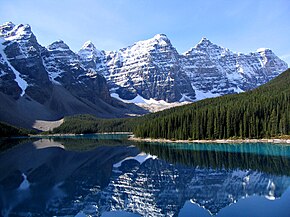Deltaform Mountain
| Deltaform Mountain | |
|---|---|
 Deltaform Mountain | |
| Highest point | |
| Elevation | 3,424 m (11,234 ft)[1][2] |
| Prominence | 822 m (2,697 ft)[3] |
| Parent peak | Hungabee Mountain (3492 m) |
| Listing | |
| Coordinates | 51°18′06″N 116°14′43″W / 51.30167°N 116.24528°W[4] |
| Geography | |
| Country | Canada |
| Provinces | |
| Protected area | |
| Parent range | Bow Range |
| Topo map | NTS 82N8 Lake Louise[4] |
| Climbing | |
| First ascent | 1 September 1903 by A. Eggers, H.C. Parker, C. Kaufmann, and H. Kaufmann[3] |
| Easiest route | rock/snow climb |
Deltaform Mountain is one of the mountains in the Valley of the Ten Peaks, located on the Continental Divide on the border of British Columbia and Alberta, and also on the border between Banff and Kootenay National Parks in Canada. The mountain was originally named Saknowa by Samuel Allen but Walter Wilcox named it to its official title in 1897 as it resembles the Greek letter delta.[1][4]
Deltaform was first climbed in 1903 by August Eggers and Herschel Clifford Parker who were guided by Christian and Hans Kaufmann.[1][3]
Climbing routes
The two main climbing routes are:[1]
- North-West Ridge (Normal Route) II 5.5
- North Face, The Supercouloir IV 5.8
Geology
Deltaform Mountain is composed of sedimentary rock laid down during the Precambrian to Jurassic periods.[5] Formed in shallow seas, this sedimentary rock was pushed east and over the top of younger rock during the Laramide orogeny.[6]
Climate
Based on the Köppen climate classification, Deltaform is located in a subarctic climate with cold, snowy winters, and mild summers.[7] Temperatures can drop below −20 °C (−4 °F) with wind chill factors below −30 °C (−22 °F).
See also
References
- ^ a b c d "Deltaform Mountain". cdnrockiesdatabases.ca. Retrieved 2004-05-14.
- ^ "Topographic map of Deltaform Mountain". opentopomap.org. Retrieved 2023-07-23.
- ^ a b c "Deltaform Mountain". Bivouac.com. Retrieved 2008-12-31.
- ^ a b c "Deltaform Mountain". BC Geographical Names. Retrieved 2016-07-28.
- ^ Belyea, Helen R. (1960). The Story of the Mountains in Banff National Park (PDF). parkscanadahistory.com (Report). Ottawa: Geological Survey of Canada. Archived (PDF) from the original on 2015-10-02. Retrieved 2019-09-13.
- ^ Gadd, Ben (2008). Geology of the Rocky Mountains and Columbias.
- ^ Peel, M. C.; Finlayson, B. L.; McMahon, T. A. (2007). "Updated world map of the Köppen−Geiger climate classification" (PDF). Hydrol. Earth Syst. Sci. 11 (5): 1633–1644. Bibcode:2007HESS...11.1633P. doi:10.5194/hess-11-1633-2007. ISSN 1027-5606.



